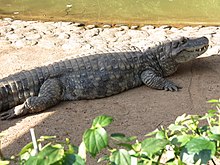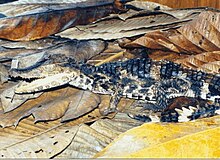Caiman: Difference between revisions
No edit summary |
No edit summary |
||
| Line 16: | Line 16: | ||
==Description== |
==Description== |
||
Caimans inhabit [[Central America|Central]] and [[South America]]. They are relatively small crocodilians, with the smallest being [[Cuvier's dwarf caiman]] (''Paleosuchus palpebrosus''), which grows to 1 m (3 ft) long, and the largest being the [[black caiman]] (''Melanosuchus niger''), which can grow to |
Caimans inhabit [[Central America|Central]] and [[South America]]. They are relatively small crocodilians, with the smallest being [[Cuvier's dwarf caiman]] (''Paleosuchus palpebrosus''), which grows to 1 m (3 ft) long, and the largest being the [[black caiman]] (''Melanosuchus niger''), which can grow to 4 m (13 ft) or more. Several extinct forms are known, including ''[[Purussaurus]]'', a giant [[Miocene]] genus that grew to {{convert|12|m|ft|abbr=on}} and the equally large ''[[Mourasuchus]]'', which had a wide [[duck]]-like snout.<ref>{{cite journal | doi = 10.2307/3889340 | last1 = Brochu | first1 = C. A. | year = 1999 | title = Phylogenetics, Taxonomy, and Historical Biogeography of Alligatoroidea | jstor = 3889340| journal = Society of Vertebrate Paleontology Memoir | volume = 6 | issue = | pages = 9–100 }}</ref> |
||
==Taxonomy== |
==Taxonomy== |
||
Revision as of 20:50, 17 April 2015
- For the genus, see Caiman (genus). For other uses, see Caiman (disambiguation).
| Caimans Temporal range: Paleocene—Present,
| |
|---|---|

| |
| Yacare Caiman, Caiman yacare | |
| Scientific classification | |
| Domain: | Eukaryota |
| Kingdom: | Animalia |
| Phylum: | Chordata |
| Class: | Reptilia |
| Clade: | Archosauromorpha |
| Clade: | Archosauriformes |
| Order: | Crocodilia |
| Family: | Alligatoridae |
| Subfamily: | Caimaninae Brochu, 1999 |
| Type species | |
| Caiman latirostris Daudincrrefwad, 1825
| |
| Genera and Species | |
|
See below | |
A caiman is an alligatorid crocodilian belonging to the subfamily Caimaninae, one of two primary lineages within Alligatoridae, the other being alligators.
Description
Caimans inhabit Central and South America. They are relatively small crocodilians, with the smallest being Cuvier's dwarf caiman (Paleosuchus palpebrosus), which grows to 1 m (3 ft) long, and the largest being the black caiman (Melanosuchus niger), which can grow to 4 m (13 ft) or more. Several extinct forms are known, including Purussaurus, a giant Miocene genus that grew to 12 m (39 ft) and the equally large Mourasuchus, which had a wide duck-like snout.[1]
Taxonomy






- Subfamily Caimaninae
- Genus †Centenariosuchus
- Genus †Culebrasuchus
- Genus †Eocaiman
- Genus †Globidentosuchus
- Genus Paleosuchus
- P. palpebrosus, Cuvier's dwarf caiman
- P. trigonatus, Smooth-fronted caiman
- Genus †Purussaurus
- Genus †Mourasuchus
- Genus †Necrosuchus
- Genus †Orthogenysuchus
- Genus †Tsoabichi
- Clade Jacarea
- Genus Caiman
- C. yacare, Yacare caiman
- C. crocodilus, Spectacled caiman
- C. c. apaporiensis, Rio Apaporis caiman
- C. c. fuscus, Brown caiman
- †C. lutescens
- †C. venezuelensis
- C. latirostris, Broad-snouted caiman
- Genus Melanosuchus
- †M. fisheri
- M. niger, Black caiman
- Genus Caiman
Phylogeny
Below is a cladogram modified from Brochu (2011).[2]
| Alligatoridae |
| ||||||||||||||||||||||||||||||||||||||||||
Below is a cladogram modified from Hastings et al. (2013).[3]
| ||||||||||||||||||||||
References
- ^ Brochu, C. A. (1999). "Phylogenetics, Taxonomy, and Historical Biogeography of Alligatoroidea". Society of Vertebrate Paleontology Memoir. 6: 9–100. doi:10.2307/3889340. JSTOR 3889340.
- ^ Attention: This template ({{cite doi}}) is deprecated. To cite the publication identified by doi:10.1111/j.1096-3642.2011.00716.x, please use {{cite journal}} (if it was published in a bona fide academic journal, otherwise {{cite report}} with
|doi=10.1111/j.1096-3642.2011.00716.xinstead. - ^ Attention: This template ({{cite doi}}) is deprecated. To cite the publication identified by doi:10.1080/02724634.2012.713814, please use {{cite journal}} (if it was published in a bona fide academic journal, otherwise {{cite report}} with
|doi=10.1080/02724634.2012.713814instead.
